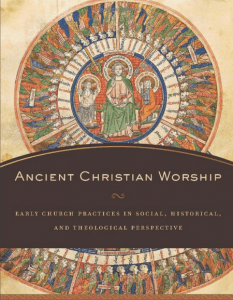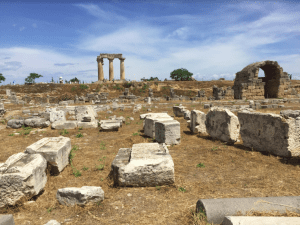 Formation results from practices, though not without attentiveness to the Spirit and the work of God’s grace in us. One of the practices Christians have learned is time — that is, Sunday and fast days and the church calendar. Hence, Andrew McGowan’s last chp in his exceptional book, Ancient Christian Worship, concerns time.
Formation results from practices, though not without attentiveness to the Spirit and the work of God’s grace in us. One of the practices Christians have learned is time — that is, Sunday and fast days and the church calendar. Hence, Andrew McGowan’s last chp in his exceptional book, Ancient Christian Worship, concerns time.
He begins with Sunday. His opening is a very good reminder, especially for those who are more liturgical (and a good push to consider for those who aren’t!).
None of these elements, however—Sunday included—were always and immediately obvious to the first generation or two of Christians. Yet none of them emerged from nowhere or was merely imposed arbitrarily or through some external authority. Rather, the development of Christian time is an increasingly detailed affirmation of how the structure of history, and of the cosmos in and through which history flowed, reveals and serves God and calls humans to God’s service (218).
Here are the important NT texts:
Mark 16:2 Very early on the first day of the week, just after sunrise, they were on their way to the tomb
1Cor. 16:1 Now about the collection for the Lord’s people: Do what I told the Galatian churches to do. 2 On the first day of every week, each one of you should set aside a sum of money in keeping with your income, saving it up, so that when I come no collections will have to be made. 3 Then, when I arrive, I will give letters of introduction to the men you approve and send them with your gift to Jerusalem.
Acts 20:7 On the first day of the week we came together to break bread. Paul spoke to the people and, because he intended to leave the next day, kept on talking until midnight. 8 There were many lamps in the upstairs room where we were meeting. 9 Seated in a window was a young man named Eutychus, who was sinking into a deep sleep as Paul talked on and on. When he was sound asleep, he fell to the ground from the third story and was picked up dead. 10 Paul went down, threw himself on the young man and put his arms around him. “Don’t be alarmed,” he said. “He’s alive!” 11 Then he went upstairs again and broke bread and ate. After talking until daylight, he left. 12 The people took the young man home alive and were greatly comforted.
Rev. 1:10 On the Lord’s Day I was in the Spirit, and I heard behind me a loud voice like a trumpet,
This does not settle it for some; each text is open to some flexibility in meaning so many think Sunday as the Christian “Sabbath” and the day on which services were held does not come until later.
Letter of Barnabas:
Furthermore [God] says to them, “Your new moons and the Sabbaths I cannot tolerate.” Do you see how he speaks? “The Sabbaths are not acceptable to me, but that which I have made, in which giving rest to all things I will make the beginning of an eighth day, which is the beginning of another world.” Therefore we also celebrate the eighth day with gladness, in which also Jesus rose from the dead and, being revealed, ascended into heaven. (Barn. 15.8)
Ignatius: “overturning the old things came to the possession of a new hope, no longer observing the Sabbath, but living according to the Lord’s [day?], in which also our life sprang up again because of him and his death” (Ign. Magn. 9.1) (220).
These two texts are overtly supersessionistic or replacement in orientation, and hostile toward Sabbath practices. The next text has moved beyond this anti-posture toward an assumption of Sunday service and practice.
Later we read this in Justin Martyr:
And on the day called “of the sun,” when all who live in cities or in the country gather in one place, an assembly occurs, and the memoirs of the apostles or the writings of the prophets are read, for as long as there is time; then, when the reader has finished, the president presents a verbal admonition and challenge to the imitation of these good things. Then we all rise together and offer prayers, and, as we said earlier, when the prayer is ended, bread is offered, and wine and water, and the president similarly offers prayer and thanksgiving, according to his ability, and the people agree, saying Amen; and there is a distribution and participation for each from that for which thanks have been given, and it is sent to those who are absent by the deacons. (1 Apol. 67.3-5)
A theology of creation and rest and teaching and worship all eventually gathered into this Sunday event.











